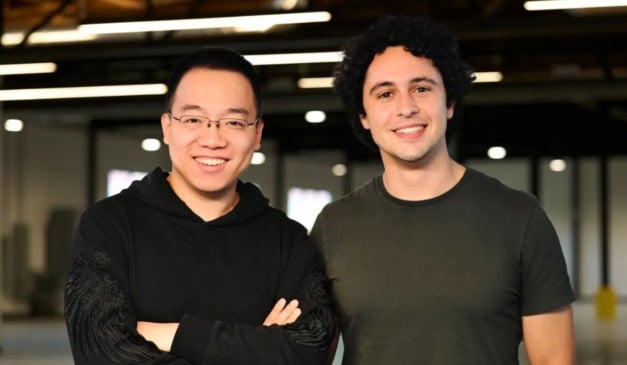
As the “anywhere office” trend gathers momentum, an Estonian startup is seeing an expansion of its Brazilian workforce, which is contributing beyond technical expertise by helping shape the firm’s commercial strategy.
Headquartered in Tallinn, Alvin focuses on automating data governance to simplify processes for data teams. The company was founded in 2018 by Dan Mashiter, Romet Kallas and Martin Abelson Sahlén and has since attracted several well-known European and Silicon Valley investors.
Over the last year, the company started to accelerate its growth plans and hired Gui Lozano, a Brazilian recruitment specialist based in Finland, to ramp up its hiring efforts. So far, about half of the firm’s headcount comes from Brazil; the majority works remotely and some don’t have any plans to relocate.
By the end of 2022, Alvin expects to employ 30 professionals in total, though this could change as the company expands. “We have been blown away by how many applicants we’ve had, and we’ve been quite successful in hiring quickly. The current focus is on onboarding, but if there are any changes in terms of funding, these things might well accelerate”, says Sahlén, in an interview with Startups.
Meanwhile, the startup is making inroads from a commercial perspective. The company has signed its first deal and carrying out several proofs of concept with potential clients from various industry sectors to better define its product-market fit as the workforce readies to support the new development phase.
“Looking back, it was just Dan and me a year ago – and now we are approaching 20 people. In its current form, the company is growing fast and [focusing on] finding an optimal balance of having processes in place to keep things going, while also allowing people to work independently and autonomously”, the founder points out.
Building the Estonian-Brazilian connection
According to Sahlén, the “Brazilian connection” at Alvin emerged from the founders’ research into the skills capabilities the company needed to support its growth plan. “As we started digging around in the [data] space and looking for people we thought were interesting, a lot of Brazilians started popping up. Then we found someone doing some exciting work in the Google Cloud space”, he says.
“We thought ‘we need to get him, as he would be really transformational for the company.’ So in a couple of weeks, he left a company he had been working for over the last ten years to join us”, the entrepreneur notes. The professional in question is Marcelo Costa, a Google Cloud certified architect and data engineer who previously worked for Brazilian multinational CI&T. Sahlén adds that the content the firm publishes on its vision, in platforms such as Medium, also plays a significant role in attracting new talent.
“If I had to put my finger on something that we have done quite well and invested a lot of time in, is content, shaping it to be very interesting not just for potential clients, but also people who might want to join us as employees. In hindsight, I think that was among the reasons why Marcelo was struck by our vision”, the founder says.
Like many early-stage companies, Alvin’s co-founder argues that a lot of the initial traction at his company comes from the passions and networks of its first employees, which means that Brazilians are playing an essential role as the Estonian firm grows.
“We are very pragmatic. Having many Brazilian people in the company has also opened a lot of interesting commercial opportunities for us. If these developments continue, we are going to expand hiring in Brazil, not just on the technical side but also to support our commercial, support and business development activity”, Sahlén says. “Having a lot of people with great networks that can speak the local language is a great advantage to us.”
As the Brazilian contingent of Alvin’s workforce grew, it became clear to the Estonian firm that foreign companies undervalue the country’s tech expertise pool. “It is a continent, with so much talent that is untapped for many reasons, including language since many Brazilians don’t speak English well, and also a bit of laziness to look outside their culture and comfort zone”, he says. “What they are losing out on is a lot of great people who can add so much not just from a talent standpoint, but from a cultural perspective.”
On the other hand, Brazil itself loses out by eroding its skills pool as companies like Alvin become increasingly aware of the expertise available and willing to work for international companies – without necessarily having to relocate. “We have taken a lot of the right steps to cut through the noise and get some high-quality people, and to get the attention of future employees, and generally making them feel valued – we are humbled that these people are applying to work with us”, Sahlén points out.
“It is right to say the remote-first culture introduced by the pandemic means a lot of people are understanding their worth and looking beyond the horizon. Talent is increasingly becoming a global thing, and this is something I don’t think anyone can resist. So you have to put strategies in place as a company to ensure that you stay on top of that”, he adds.
Also from a recruitment perspective, Lozano says that companies – including startups – create processes geared towards finding reasons to reject people instead of hiring them. “Companies are looking for a 100% match with what they believe they need. And that tends to be quite unrealistic”, Alvin’s recruiting expert says, adding that firms should focus on the problem that needs to be sold rather than asking for many years of experience that might not be necessary for the job at hand.
“We don’t create unrealistic requirements or specific technical tests. On the contrary, the whole thing is very conversational: it is all about trying to offer a human-driven recruitment process”, the recruiter says. “We are very transparent about our process, from salary [Alvin sets a baseline salary of 21,000 Brazilian reais], all the way to feedback: even if you are truck driver and your CV is not suitable at all, you will get feedback anyway.”
Opportunities ahead
According to Sahlén, who is also the company’s chief technology officer, the market opportunity for Alvin is vast: “Considering the data transformation journeys that companies are now embarking in droves and the large migrations to the cloud they are promoting, the current question is, how mature these companies are, and how far they’ve come in terms of data governance – we feel we can add value in that respect”, he points out.
“As businesses grow and mature, they suddenly realize they have a great deal of pressure around governance and accuracy of data reporting, and end hiring lots of people to do that. That is where we come in, with a lot of automation and a tool that can perform these checks and balances – we are particularly excited about bringing more of these principles of software engineering and DevOps into the data processes”, the founder adds.
When it comes to the types of customers the company is aiming for, while scale-ups would be a natural fit for the Estonian firm, the CTO argues that Alvin is not ruling out working with so-called traditional companies. “There are a lot of enterprises out there that are quite modern and progressive”, he notes.
Regarding what the future holds for Alvin, Sahlén is optimistic about the prospects ahead. “The data space is quite special, and that has been especially the case over the last year,” he says, referring to interest from potential future backers.
Moreover, the founder noted that markets where data protection regulations are in place, such as Europe and Brazil, will be particularly interesting for the startup in the months ahead.
“Privacy is a big driver, but companies also care a lot more about the quality of their data and its trustworthiness. So whereas for many companies concepts like data lineage and governance would have been a bit more abstract and theoretical, now these things are becoming a lot more concrete and mainstream”, the founder concludes.








